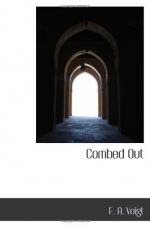The rain came swishing down. Water gathered on the canvas above, and heavy drops fell splashing on to the floor with monotonous regularity. Somebody was muttering curses in his sleep. Others were snoring loudly. I lay awake for a long time, staring into the black darkness of the marquee. Suddenly—it must have been two or three o’clock in the morning—the familiar rumbling noise broke out in the distance. It seemed to spread along the whole horizon. The “stunt” had begun.
A drowsy voice growled: “They’re at it again—why can’t they stop it once and for all.” Another groaned deeply and muttered: “Awful—awful slaughter—blackguards, blackguards.”
The uproar increased. I was filled with a terrible dejection, but I went to sleep in the end.
It was broad daylight when I woke up to the sound of innumerable motor-cars coming and going out on the road. The wounded were streaming in.
The operating theatre was alive with figures clothed in white, blood-stained garments, bustling up and down, or standing in groups around the other tables. At the far end of the theatre someone was blubbering like a little child.
“Here, come on—hold this man’s leg up. What d’you think you’re here for?” It was the surgeon at the next table who was speaking to me.
I grasped the leg by the foot—it was quite cold—while the orderly removed a bandage from the thigh. The bone had been shattered. A bullet had also entered the man’s chest, making a small round puncture. A shell fragment had struck his upper lip, leaving a jagged triangular hole below the nose. Several teeth had been knocked out. The upper palate had been gashed and partly separated from the bone. It hung inside the half-open mouth like a shrivelled flap. He breathed feebly and irregularly. The surgeon bent over him and asked him if he had been wounded long. He answered in low, hoarse whispers that he had been lying in the mud and rain for several days. Then he turned his eyes up so that only the whites were visible. They remained rigidly fixed in that position. He received a dorsal injection, being too weak for chloroform. The shattered thigh was painted with picric acid and the tourniquet tightened above the injury. The surgeon cut through the leg with a circular sweep of the knife, the splintered bone offering no resistance. The limb came off in my hands. I held it for a moment, being awed by it. It seemed very heavy. Then I dropped it into the pail below. When the surgeon had dressed the stump, he made a slight incision in the forearm in order to inject a saline solution. The man, who had not uttered a sound hitherto, winced and gave a faint cry.
“Come along—hold this leg up!”




